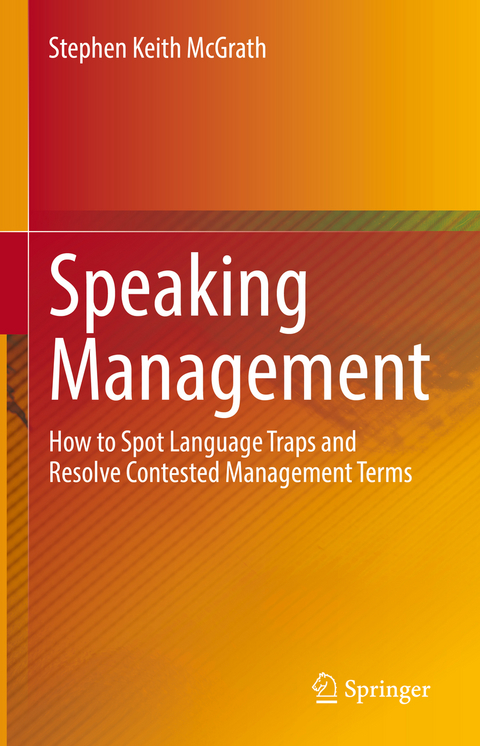
Speaking Management
Springer Verlag, Singapore
978-981-16-2215-1 (ISBN)
The book demonstrates how the seemingly straightforward matter of our understandings of the meaning of words can have major implications for the exercise of power. This book illustrates how this insight originated from management research into project governance that found lack of agreement on the definition of that term, as well as on many other important management terms. To resolve this, the impacts of evolution, philosophy and linguistics upon our everyday language usage were investigated. The research documented in this book found that the human tool called language works well for describing physical objects but has difficulty producing a common understanding of the meaningof concepts - a problem not restricted to the management field. That field is simply a microcosm that exposes a much more widespread linguistic usage problem affecting our personal, religious and political lives; one that existed at the time of Plato and Aristotle and has laid hidden for millennia.
This book includes a lexicon of 70 commonly used but confused or contested management terms, as well as a further 18 such project management terms, all developed by applying its definitional method. The terms include governance, power, ethics, leadership and their associated groups of terms. The book explores how disagreement can be resolved using these new clear definitions and extends this into an analysis of who ‘good’ ethics are good for. It also incorporates a section on “how to speak management and actually know what you are talking about”, written in the style of an ‘idiots guide’ or ‘guide for dummies’. This identifies common, everyday circumstances in which lack of agreed definitions cause avoidable confusion and provides the book’s focus on conflict dissolution rather than on conflict resolution.
Dr Stephen McGrath completed his PhD at the University of Southern Queensland. He researched the cross-discipline impacts of ‘generic’ project, program and portfolio management methodology and terminology, particularly relating to governance, across civil infrastructure and IT. This led him to identify and propose various means of avoiding linguistic traps that generate unnecessary conflict in project management as well as in general management and daily life. He is a civil engineer and Fellow of both the Institution of Engineers Australia and the Australian Institute of Project Management. He is also a senior member of the Australian Computer Society. He has 40 years of experience in developing, planning and delivering civil infrastructure projects as well as strategy and business development projects across the roads, busways, rail, marine and aviation areas of transport. He also led the team that developed the Queensland Department of Transport and Main Roads ‘OnQ’ project management system that has been in operation since 2000 and has now been used in delivering more than $20B of civil infrastructure, business development and IT projects. He has 11 papers published in international journals on the subjects of governance, steering committees, program management, program and project management methodology, stakeholders, accountability and responsibility.
| Erscheinungsdatum | 11.01.2023 |
|---|---|
| Zusatzinfo | 1 Illustrations, black and white; XX, 342 p. 1 illus. |
| Verlagsort | Singapore |
| Sprache | englisch |
| Maße | 155 x 235 mm |
| Themenwelt | Wirtschaft ► Betriebswirtschaft / Management ► Projektmanagement |
| Wirtschaft ► Betriebswirtschaft / Management ► Unternehmensführung / Management | |
| Schlagworte | Accountability • Communication • Human Resource Management • Management • The ten linguistic traps |
| ISBN-10 | 981-16-2215-9 / 9811622159 |
| ISBN-13 | 978-981-16-2215-1 / 9789811622151 |
| Zustand | Neuware |
| Haben Sie eine Frage zum Produkt? |
aus dem Bereich


